
|
March 16, 2012 - No. 37 -
Supplement BC Teachers Defend Public Education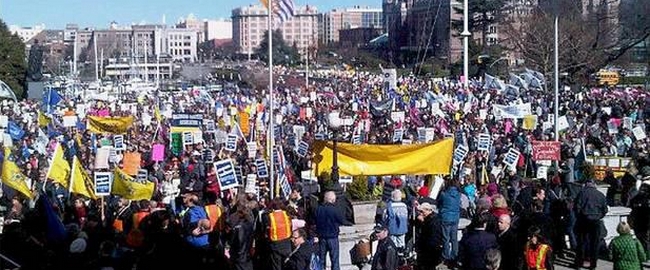 Rally of 8,000 teachers and their supporters, Victoria, March 6, 2012. The following item is edited excerpts from a transcript of the program "Discussion" broadcast on Vancouver Co-Op Radio March 7 in which host Charles Boylan interviews Glen Hansman, Second Vice-President, BC Teachers' Federation (BCTF); Chris Harris, President, Vancouver Elementary Teachers' Association; Patrick Henry, President, Sooke Teachers' Association; and Kevin Epp, Okanagan Skaha Teachers' Association. (To listen to the complete program go to: http://coopradio.org/station/archives/35). ***Charles Boylan: One of the issues of controversy generated by the media and the government is the actual provincial government financing of public education. BCTF contends that the money investment in the schooling of our children from K to 12 has declined. Can you speak to that? Glen Hansman: Absolutely ... the decline actually started during the '90s under the NDP because if you look back 20 years ago, K-12 funding as a percentage of the provincial budget, was about 26 per cent. That was back in the 1991/92 school year. And then 10 years later that had dropped to just under 20 per cent and then last school year it had sunk all the way down to about 15 per cent of the overall provincial budget. The current government likes to repeat over and over again -- "highest funding ever." [...] Not only has K-12 funding as a percentage of the provincial budget decreased dramatically since the late 80s, but ... what it buys in school districts is a whole other matter, and that's dwindling as well. [...]
CB: The issue of special needs education does get talked about quite a bit and one reason is that there are increasing numbers of special needs students in classrooms. I'd like you to talk a little bit about that. GH: One of the first things that the BC Liberal government did after coming to power in 2001 was to interfere with that round of teachers' collective bargaining by introducing two pieces of legislation, Bill 27 which imposed a new collective agreement and effectively vapourized several teachers' collective agreements of some of our locals in their entirety. But Bill 28, its sister piece of legislation, was the unconstitutional legislation that removed all references to class size, class composition, ratios for ESL teachers, baseline service levels for Special Ed teachers of all kinds, teacher-librarians, etc. When those things were taken away, it facilitated the elimination of thousands of teaching positions around the province, including 700 full-time equivalents of Special Ed teachers around the province. It didn't take very long for those [positions] to disappear because, unless you have those baseline guarantees in the collective agreement -- those things that we fought to get -- coupled with eroding funding means the loss of those jobs. But the kids are still there. Yes, there's been declining enrollment over the past few years, but the number of kids with special needs, autism in particular, has remained steady or is growing, depending on the special needs designation. Autism I mention because the number of kids on the autism spectrum disorder is increasing around the province. Basically, the effect has [been] that BC schools have had to endure a decade of cuts. A whole generation of kids has now grown up going to school in larger classes, without adequate support and a lack of specialist teachers to meet all their diverse learning needs. CB: Someone told me that the Premier, who is the former Minister of Education, sends her offspring to a private school. GH: That's true, St. George's I believe.
GH: It's absurd but it's not on the public's radar for the most part. The BC School Trustees Association to their credit about a year and a half ago carried a motion calling for public funds going to private schools to be cancelled. But I don't think the public at large appreciates the fact that so much money does go into so-called independent schools. It's like having your own sort of private club and the taxpayers paying for it. If you look at the ads for these schools, they are often advertising their small classes and their beautiful computer labs and all the opportunities that they have for the kids in the arts and everything. All things that we would still have in all of our neighbourhood public schools had Christy Clark, when she was Minister of Education, not enacted Bill 28. So the families that can fork out $15,000 to put their kids into private school, they get all the great stuff. The taxpayer subsidizes that and everybody else goes to their neighbourhood school where services have continued to be eroded. It's obscene, in our opinion. CB: I have to tell you as a teacher of foreign ESL students in Vancouver -- talking to the youth from Brazil, Venezuela, Colombia -- all those kids come from private high schools. In Brazil it's so ironic, that the kids who get the best marks get to go to free government-financed universities but their parents spend fortunes to put them into high quality private elementary and secondary schools. The kids that go to the underfinanced public schools don't stand a chance. GH: There are two other arguments to be made. One is that it's bad for society to have these boutique clubs because it separates the haves and the have-nots. Another [is]: it is fine if you want to send your child to a private club, great, but you pay the freight in its entirety. Don't expect money that should be going into public education to be going to those programs. CB: Our next guest is Chris Harris, President of the Vancouver Elementary School Teachers' Association. Could you elaborate for us what the issue of seniority and "suitability" being raised by the Minister of Education is all about? Chris Harris: This is really kind of a manufactured crisis that the Minister is putting out there.... When job postings come out and teachers that have already been hired by the district see another job at another school or maybe even in their own school, a job that they think that they can do and they would want to have, they apply for that job. There's already language in the collective agreement that makes sure that you have to be qualified in order to take that job. The language in most collective agreements around the province is something like "the most senior qualified applicant" so when George Abbott says there's a big problem because we have social studies teachers teaching math and math teachers teaching French and all those sorts of things, we say, "Can you give us an example of where this has happened?" This hasn't happened. Teachers are applying for positions that they know they can do, that they're qualified for and that there's a reasonable expectation that they can do. When they take those positions, they do a great job. What getting rid of seniority actually does is allow principals to pick and choose. We know that when that happens, when managers pick and choose, it's often not bona fide qualifications that they're making their choices on. It's generally about things like favouritism. What will this person do beyond the job and things like that. So for teachers, that's a really important thing. We don't want to be put in situations where somebody is being picked over another person because of intangibles or things that aren't measurable or because the principal likes this teacher more than that teacher. That's a really big concern to us. The other concern around seniority are layoffs. We want to make sure that if there's going to be a layoff, that the teachers that have put the most time in with the employer, that have dedicated their lives to working for a certain school district, [are] going to be the last people laid off. It'll be the new hires that are laid off. They will retain some kind of recall rights so that when jobs come back or there are jobs posted, that those people can get back to work too. So that's kind of where we've been attacked by George Abbott and the BC Liberal government around seniority. It's a big concern to teachers.
CH: Absolutely. It's a fair system.... It doesn't discriminate. It's about what amount of seniority you have and it's a completely fair way of doing layoffs, of posting into positions. You have to remember that we're talking about people that have already been hired, that have already worked for an employer over numbers of years. We're not talking about somebody coming off the street and getting their foot in the door and just getting a job. We're talking about people who have worked for years and years, in some cases master teachers, teachers that are there mentoring others. Obviously, [for] the most senior people there, the only fair way to go about it is to give them some priority and make sure that when they post into positions that they get those jobs before people with less seniority, as long as they're qualified. We're not saying that they shouldn't be qualified for positions. CB: Can you speak to the issue of declining enrollment in Vancouver, which is being used to cut services. CH: It's a very interesting question. There's no doubt that in the past eight years or so that Vancouver has seen some declining enrollment and in particular in certain sections of the city. For instance, if you were trying to enroll your child at, let's say, a school in Yaletown, at Elsie Roy, you'll find out that there's a waiting list for you to get into that school. Not because it's a school that people are trying to get to from cross boundary or from another city, but because there's just such a big concentration of children in that neighbourhood where no planner thought that families would be moving into, Yaletown. And then you look at another part of the city where you're seeing a lot of social housing being shut down and lots of families moving outside of Vancouver such as to Surrey because there's not the affordable housing that used to be [in Vancouver], and so there's declining enrollment in schools around there. It's a very complicated piece around enrollment in Vancouver. We also have a number of private schools in Vancouver and obviously, they take a percentage of the students that live in Vancouver. It's all demographics. There's going to be periods of time in history, where you're going to see increasing enrollment and then decreasing enrollment. Then it changes course and then you're going to have increasing enrollment and that's what we're seeing in Elementary right now. We've hit the plateau and all the projections show that enrollment in Elementary is going to start increasing again. We saw that last year when they introduced all day kindergarten. That gave a momentary bump in enrollment in Elementary. Also, what that means is all those years of declining enrollment are now just hitting the secondary schools so now they're experiencing some declining enrollment. It's the demographics that goes on in any kind of population. What you don't want to do is starve the system because you have these momentary blips.... You'll see in some districts, like Prince George, where they've closed enormous amounts of schools and then they're mothballed. It's very difficult to open them again when actually the enrollment starts going the other way. What's really needed is steady, constant funding so that districts can go through times of some declining enrollment and have the facilities in place when that enrollment goes up again. CB: What, in your view, is the most significant negative feature of Bill 22 vis-à-vis workers' and teachers' rights?
CB: Our next guest is Patrick Henry, President of the Sooke Teachers Association. Sooke is a small town on the west coast of Vancouver Island, northwest of Victoria. Patrick Henry: First, to contextualize our Sooke District because Chris made reference to the demographic pressures that are brought to bear and what happens with funding and distribution of students and so on. Sooke is regarded as a mid-sized school district. We're about the size of New Westminster in terms of number of students and teachers. We are the second fastest growing district in the province. Surrey is the only one that's growing faster. And referencing back to what Chris was saying about how decisions are made around demographics, in spite of the fact that we are a very rapidly growing district, we are facing exactly the same pressures, exactly the same deficiencies, the same cuts, and all the same issues that are brought to bear in the small sized districts. When the government talks about declining enrollment affecting what's happening in funding, it's not really a very good sell. CB: You wanted to speak about the misinformation published in the mass media. PH: With respect to what's happening in the media, the greatest challenge for teachers, whenever we have challenges with the government, they are exacerbated by... either editorial agendas or shortcomings in the reportage, particularly in the print media. I guess the most glaring issue for a teacher is ... the profound emphasis on salaries. Sure salary is one of the things that is on the table, but it's the way that it's framed and it's the way that it's put out in front and repeatedly hammered away at in many broadcast and print media, when in fact anyone who spent time at the rally on [March 6] would have been hard-pressed to find very many signs that made any reference to dollar signs or money. When it is brought up, we like to speak about things in terms of equity, certainly, when the next-door neighbours to us are the highest paid teachers and we are close to the bottom. It's worth mentioning, but what's most concerning about issues like that when they're brought up in the press, they're presented as "demands" and there really is a semantic gulf between the meanings of the words "demand" and "proposal." The people reading the news, if they don't follow it closely or do their own research are going to say, "Oh, it's the teachers demanding money and that's why things aren't moving ahead at the bargaining table," and of course, nothing could be further from the truth. Salary is one of about 50 proposals that teachers have brought forward, and we would like to discuss, negotiate. We'll talk about almost anything but of course the government said no, we're not going to talk about any of that. We just want to talk about concessions. Because of course, they demanded that concessions or contract stripping is necessary in order to align our collective agreements with the education plan.
It's really about union busting more than anything else. I think that when we see what happened at the rally and we hear the support we have from the BC Federation of Labour and unionized groups around the province, they recognize that this is a piece of legislation that is first and foremost meant to undermine workers' rights, and [is] especially offensive to teachers because we made great sacrifices. We gave up preparation time. We gave up professional development funding. We gave up benefits in exchange for things like smaller classes, guaranteed ratios of specialist teachers as Chris referred to, like counsellors and learning assistants, integration supports. We've made sacrifices in our benefits and things that we could proceed with and improve year by year in order to improve learning conditions in the classroom. So yes, we have a low salary on the national scale and really have no one but ourselves to blame, because we've been trading it away. We've been moving it down the priority list in order to get reasonable class size limits and non-enrolling teaching ratios and now the government has said, "Well, we signed all those agreements in the past but we've changed our mind. We're not honouring those agreements. We're going to rip them up and things aren't moving well at the bargaining table and so we're just going to make a law and eradicate those portions of the agreement that we find offensive, or too expensive." CB: You're quite right, as far as the media projection it's all about "if they get the 15 per cent wage increase which they're demanding then it will cost us billions of dollars and then everybody else will want it and it'll be billions and billions of dollars." ... Of course there's no discussion really about the billions of dollars that they handed over to the very rich, the corporations with things like the HST, with the income tax cuts and various other measures that they have paid the rich with, from public funds, funds that could well have been invested in health care and education, social housing and the like. That discourse is very very distorted and you don't see the media picking it up and enlightening the public about those important facts. PH: I think that Susan Lambert has spoken eloquently and often about the ideological agenda of this government and there was information out in the press during the Occupy Victoria movement that we had going on, as there was elsewhere around the province that spoke to corporations enjoying near to record high profits at a time when the provincial government made decisions to move tax on corporate income to the lowest it's ever been, and at the same time, make up for that revenue shortfall by bringing in the HST.
There's a little snippet right there that we will rarely see in the media. Teaching has one of the highest attrition rates of any profession, partly due to the pressures that are attached to the role of teaching and also the struggle that so many people new to the profession go through. They just find that they can't wait any more. They want to own their own home. They would like to start a family. When you're working piecemeal essentially for years at a time before you can get a continuing contract it just becomes too much and it's not worth the stress, so it leads a lot of people to leave the profession, unfortunately. CB: Do you want to say anything more about the relationship between the teachers and the rest of the working community in the Sooke area? How are your connections with the people there? How well-developed is the discourse between the teachers and the community? PH: There was graphic evidence of exactly that today. We held a rally where our entire membership [participated]. We have a little over 700 teachers in the Sooke District. The Sooke District is the largest employer actually on the west shore, which is a group of four municipalities. We lined up on the side of Veteran's Memorial Parkway in Langford and we stretched people for pretty close to a kilometre and the response was overwhelming. The noise was deafening at times with honks and support and smiles and waves and it was constant. It went on for an hour of lunch-hour traffic. It was heartwarming. It was inspiring and it really made it clear to us that what's being printed some days in the letters portion of the paper really isn't telling the whole story. We saw graphic evidence of that from people in our community, people who share our play and work spaces, people who are parents of our kids, and they were honking in droves in support. I'm sure that we've tried the patience of our parents and we are always extremely grateful for their patience when these conflicts arise with government but nonetheless I believe that the majority stand in support. CB: Our next guest is Kevin Epp, President of the Okanagan Skaha Teachers Association. Kevin Epp: I want to start off by thanking all the members of Co-op radio in Vancouver. As good cooperative members they understand the power of cooperative action. Being a prairie kid and a farm boy I grew up around Co-op stores and communities that work together. Without the support of those members, I know that programs like yours couldn't happen. I just really want to express my heartfelt thanks to everybody that joins up as a member and encourage everybody to renew those memberships and bring along a friend.... My grandfather and my uncle are rolling over in their graves as Mr. Harper bowled over the democratic rights of farmers when they spoke out against the dismantling of the Wheat Board and our own government here in this province is doing exactly the same thing, following suit, and going against the will of their own people. They're not representing the people. They are imposing their will. CB: Would you elaborate on why it's very necessary for farming people, working people, professional people like teachers and nurses and others, to build a serious opposition to call this agenda of the Harper and Clark governments to account, and to really put a block, a serious organized opposition against this nation-wrecking, manufacturing-destroying social program-wrecking that's going on in BC and across Canada? KE: [...] There is no doubt in my mind that our governments have shifted their actual reason for being from the day when I started teaching over twenty years ago and I taught young students in social studies classes about the fundamental operations of the government system in Canada, in our provinces and in our country, our constitution, what was previously, from a colony, the struggles and the movements we went through to evolve. What we're seeing is not, I don't know if I can call it a devolution or if I can call it a theft, but it is a theft of our governments, both nationally and provincially to a neoliberal agenda that is saying that the working class and the citizens of our province and the citizens of our country are no longer what governments represent. What governments represent is something we used to teach students about that was something that democracy rose out of, which was an oligarchy, which was controlled by some group of any kind of power, and it was concentrated in the hands of a few and we have returned to that.
The BCTF and my local union, the Okanagan Skaha Teachers
Union, we have a kind of participatory democracy.... Everyone has a
vote and every single voice from Susan Lambert to my brand new
teacher-on-call
substitute teacher who started working a month ago, has a voice in this
organization across this province.
That voice has a message [and] is heard through our democracy in our
union.... Diverse opinions, no matter what the opinion, are celebrated
because we celebrate the fact that we are an organization.... In a
participatory democracy like the BCTF, we take our time and we debate.
We think and like the hundred mile
diet or the slow food movement, we've realized that if we slow down in
our fast-paced instant click world and we involve people, if we sit
down at those kitchen tables and we have those conversations, the
result is meaningful. It's not just about the sound bites. It's about
the people and the fact that we value each
and everybody's opinion and that they get that opinion in there. 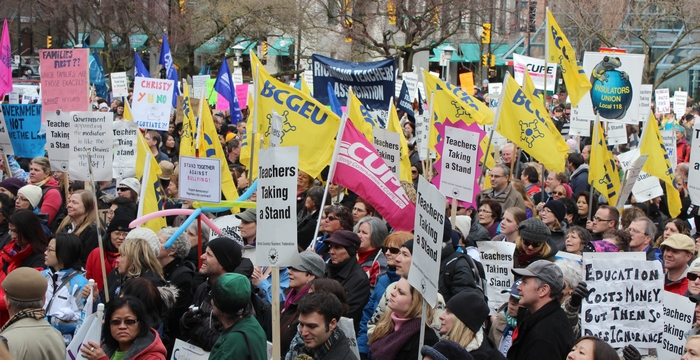 Vancouver, March 7, 2012 (Photos: TML, BC Fed, BCGEU) Read The Marxist-Leninist
Daily |
 We can point to the budget that
Kevin Falcon released two weeks ago. In that budget school district
funding was virtually frozen at $4.7 billion annually, through until
2014/15.... Inflation over that time, and the trend of this government
to download costs to school districts will continue to place
significant pressures
on school boards. If you're freezing funding at $4.7 billion that means
that there will be $100 million in cuts to public schools next year
alone because of inflationary costs. [...] Because the money is not
keeping pace with inflation and because it's not recognizing costs that
are downloaded to school districts, it means
that school districts are forced to lay off people, make classes
larger, have fewer "non-enrolling" teachers [who] are not classroom
teachers but other people in the school that play a very important
role. We're talking about resource teachers, ESL teachers,
teacher-librarians, speech language pathologists, teacher
psychologists, all those people that normally would go through the wait
lists of kids that are to be assessed, [give them] the designation that
they
need if they need it, which will then drive more services into the
school. So it's a whole systemic problem. The bulk of the budget goes
towards paying people's salaries, having
the adults there to provide the direct services to kids. If the funding
is not keeping pace with inflation then school districts have to cut
more and more staff and that means larger classes. It means fewer
supports for kids and it means, in particular, fewer supports for kids
with special needs.
We can point to the budget that
Kevin Falcon released two weeks ago. In that budget school district
funding was virtually frozen at $4.7 billion annually, through until
2014/15.... Inflation over that time, and the trend of this government
to download costs to school districts will continue to place
significant pressures
on school boards. If you're freezing funding at $4.7 billion that means
that there will be $100 million in cuts to public schools next year
alone because of inflationary costs. [...] Because the money is not
keeping pace with inflation and because it's not recognizing costs that
are downloaded to school districts, it means
that school districts are forced to lay off people, make classes
larger, have fewer "non-enrolling" teachers [who] are not classroom
teachers but other people in the school that play a very important
role. We're talking about resource teachers, ESL teachers,
teacher-librarians, speech language pathologists, teacher
psychologists, all those people that normally would go through the wait
lists of kids that are to be assessed, [give them] the designation that
they
need if they need it, which will then drive more services into the
school. So it's a whole systemic problem. The bulk of the budget goes
towards paying people's salaries, having
the adults there to provide the direct services to kids. If the funding
is not keeping pace with inflation then school districts have to cut
more and more staff and that means larger classes. It means fewer
supports for kids and it means, in particular, fewer supports for kids
with special needs.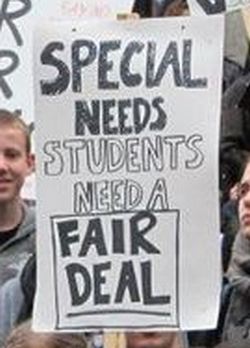
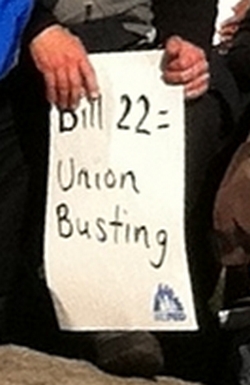
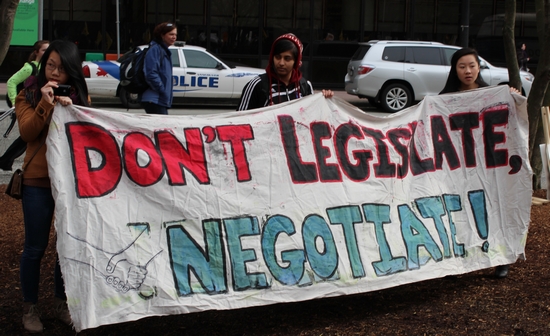
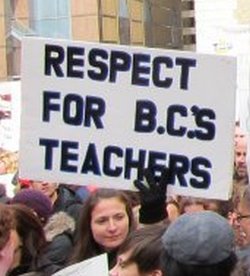 We could talk for ages
about that vacuous education plan. There are nice platitudes in there
about how teachers are very important. Yes, we agree. Personalized
learning is very important, yes, but near impossible given the class
size limits, which are only going to get larger if the legislation
passes. The emphasis
on aligning the collective agreement is really just Newspeak for the
government focus on bringing in a legislative agenda that isn't so much
about straightening things out for teachers and making education work
but about undermining collective agreements.
We could talk for ages
about that vacuous education plan. There are nice platitudes in there
about how teachers are very important. Yes, we agree. Personalized
learning is very important, yes, but near impossible given the class
size limits, which are only going to get larger if the legislation
passes. The emphasis
on aligning the collective agreement is really just Newspeak for the
government focus on bringing in a legislative agenda that isn't so much
about straightening things out for teachers and making education work
but about undermining collective agreements.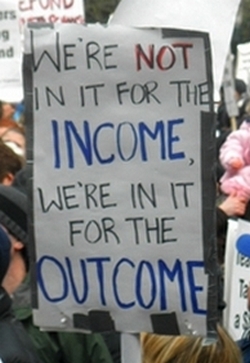 Getting back to the media
and the issues in education, one of the things that works against us as
well is really the complexity of education. It's an unusual profession
and it's a very challenging one. It's very difficult to encapsulate it
into a sound bite or into a video snippet or something you can fit into
a reasonably
sized article. Just for instance, the image that people get if they
don't delve deeply into the news, they're going to think that teaching
is a job you just walk off the street, put your name on a list and
become eligible to become a teacher. In fact, most of us have six or
seven years of university and the average graduate
finishes university with a $27,000 bill. They don't go from that into a
full-time job. It's not like you finish your degree and you become a
policeman or fireman or nurse and you just start working at your
full-time job. Most teachers don't have that luxury. They end up
working as
a Teacher On Call or on a part-time contract, sometimes for years,
until they actually get a full-time
continuing contract when they can start to repay those student loans.
And that leads to an attrition rate that is about 30 per cent within
five years.
Getting back to the media
and the issues in education, one of the things that works against us as
well is really the complexity of education. It's an unusual profession
and it's a very challenging one. It's very difficult to encapsulate it
into a sound bite or into a video snippet or something you can fit into
a reasonably
sized article. Just for instance, the image that people get if they
don't delve deeply into the news, they're going to think that teaching
is a job you just walk off the street, put your name on a list and
become eligible to become a teacher. In fact, most of us have six or
seven years of university and the average graduate
finishes university with a $27,000 bill. They don't go from that into a
full-time job. It's not like you finish your degree and you become a
policeman or fireman or nurse and you just start working at your
full-time job. Most teachers don't have that luxury. They end up
working as
a Teacher On Call or on a part-time contract, sometimes for years,
until they actually get a full-time
continuing contract when they can start to repay those student loans.
And that leads to an attrition rate that is about 30 per cent within
five years.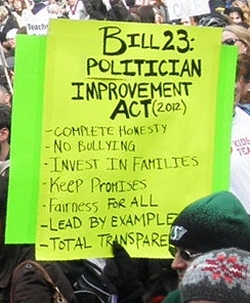 Is it because the pendulum
has swung? Or is it because we have not been stewards of our own
democracy and that we haven't been guaranteeing our own freedoms by
standing up and speaking out? What's happened is that we're
marginalized now. The media has a message and that message has been
controlled....
I'm in Penticton and we represent Summerland, small bedroom communities
and wine communities, Naramata, Kaleden, all small farm communities....
Our people in the hinterland are not asking the question, "Has our
government in Ottawa lost sight of the small communities in the west,"
which was the constant
story I heard as a young boy growing up on the Prairies.... Now I'm
hearing from people on a daily basis that Victoria is no longer
connected to the people across this province and it's not simply
because the ferries have got more expensive. It's because the Clark
government has raised themselves to a different place
where the only constituents that they converse with and the only
constituents that matter are the corporate constituents who donate
large amounts of money and have the ear of the government. I don't
think there's any kind of illusion any longer that Victoria and Harper
have each other on speed dial but I also don't
think that there's any illusion any longer that corporate British
Columbia, corporate Canada and corporate multinationals have our
governments on speed dial. They're not representing our people anymore,
because if they were, we wouldn't live in a province that's advertised
as the greatest place on earth, that's advertised
as the jobs plan and family first but yet has the highest child poverty
rates, that has an underfunding of public education, that has people
lining up on stretchers in the hallways in dirty hospitals getting
infections. That's not a place that represents people, takes care of
our seniors and our valued resources. So I guess
I'm going to say that there is a problem with our democracy.
Absolutely.... I think that our mainstream media try to dismiss the
problems that are going on right now. There's a war against the people
of British Columbia. There's a war on the poor. There's a war on the
middle class. There's a war on the working
people and that's a carefully constructed war of manipulation and
legislation by governments that don't represent the common person any
more, that don't listen anymore, because we don't have them on speed
dial. They don't listen to their constituents. They listen to their
corporate backers....
Is it because the pendulum
has swung? Or is it because we have not been stewards of our own
democracy and that we haven't been guaranteeing our own freedoms by
standing up and speaking out? What's happened is that we're
marginalized now. The media has a message and that message has been
controlled....
I'm in Penticton and we represent Summerland, small bedroom communities
and wine communities, Naramata, Kaleden, all small farm communities....
Our people in the hinterland are not asking the question, "Has our
government in Ottawa lost sight of the small communities in the west,"
which was the constant
story I heard as a young boy growing up on the Prairies.... Now I'm
hearing from people on a daily basis that Victoria is no longer
connected to the people across this province and it's not simply
because the ferries have got more expensive. It's because the Clark
government has raised themselves to a different place
where the only constituents that they converse with and the only
constituents that matter are the corporate constituents who donate
large amounts of money and have the ear of the government. I don't
think there's any kind of illusion any longer that Victoria and Harper
have each other on speed dial but I also don't
think that there's any illusion any longer that corporate British
Columbia, corporate Canada and corporate multinationals have our
governments on speed dial. They're not representing our people anymore,
because if they were, we wouldn't live in a province that's advertised
as the greatest place on earth, that's advertised
as the jobs plan and family first but yet has the highest child poverty
rates, that has an underfunding of public education, that has people
lining up on stretchers in the hallways in dirty hospitals getting
infections. That's not a place that represents people, takes care of
our seniors and our valued resources. So I guess
I'm going to say that there is a problem with our democracy.
Absolutely.... I think that our mainstream media try to dismiss the
problems that are going on right now. There's a war against the people
of British Columbia. There's a war on the poor. There's a war on the
middle class. There's a war on the working
people and that's a carefully constructed war of manipulation and
legislation by governments that don't represent the common person any
more, that don't listen anymore, because we don't have them on speed
dial. They don't listen to their constituents. They listen to their
corporate backers....